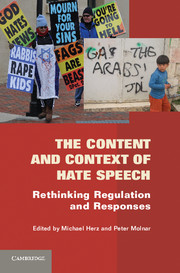Book contents
- Frontmatter
- Contents
- Contributors
- Foreword: Hate Speech and the Coming Death of the International Standard before It Was Born (Complaints of a Watchdog)
- Foreword: Hate Speech and Common Sense
- Acknowledgments
- Introduction
- Part I Overviews
- Part II Refinements and Distinctions
- 7 Social Epistemology, Holocaust Denial, and the Post-Millian Calculus
- 8 Denying Experience
- 9 What's Wrong with Defamation of Religion?
- 10 Responding to “Hate Speech” with Art, Education, and the Imminent Danger Test
- 11 Reconceptualizing Counterspeech in Hate Speech Policy (with a Focus on Australia)
- 12 Hate Speech and Self-Restraint
- 13 Hate Speech in Constitutional Jurisprudence
- 14 One Step Beyond Hate Speech
- 15 Hate Speech and Comprehensive Forms of Life
- Part III Equality and Fear
- Part IV International Law
- Index
- References
14 - One Step Beyond Hate Speech
Post-Soviet Regulation of “Extremist” and “Terrorist” Speech in the Media
Published online by Cambridge University Press: 05 June 2012
- Frontmatter
- Contents
- Contributors
- Foreword: Hate Speech and the Coming Death of the International Standard before It Was Born (Complaints of a Watchdog)
- Foreword: Hate Speech and Common Sense
- Acknowledgments
- Introduction
- Part I Overviews
- Part II Refinements and Distinctions
- 7 Social Epistemology, Holocaust Denial, and the Post-Millian Calculus
- 8 Denying Experience
- 9 What's Wrong with Defamation of Religion?
- 10 Responding to “Hate Speech” with Art, Education, and the Imminent Danger Test
- 11 Reconceptualizing Counterspeech in Hate Speech Policy (with a Focus on Australia)
- 12 Hate Speech and Self-Restraint
- 13 Hate Speech in Constitutional Jurisprudence
- 14 One Step Beyond Hate Speech
- 15 Hate Speech and Comprehensive Forms of Life
- Part III Equality and Fear
- Part IV International Law
- Index
- References
Summary
The “war on terror” in the wake of 9/11 has led to new restrictions on the freedom of the press worldwide. In the post-Soviet countries, political elites have twisted the war on terror into a fight against “extremism,” a vague term that quickly expanded to encompass almost all forms of political dissent. Moreover, the numerous local wars in the post-Soviet world have come to be seen as a new front in the global fight against international terrorism – this was certainly true of the official approach to the events in Chechnya (Russia), the Trans-Dniester region (Moldova), South Ossetia, Abkhazia and Ajara (Georgia), Andijan (Uzbekistan), Kyrgyzstan, Tajikistan, and elsewhere. Because terrorism has roots in political extremism, to overcome terrorism and terrorist organizations, the state must suppress first and foremost extremism and extremist speech; such was the motivation of the governments. On this view, all combatants became “international terrorists,” and journalists covering their illegal activity, however objectively, could be labeled extremists and accomplices to terrorists.
This chapter details the ways in which unjustified restrictions against “extremist” speech have been adopted in the name of the war on terror. These include, but are hardly limited to, expansive readings of prohibitions on hate speech.
Information
- Type
- Chapter
- Information
- The Content and Context of Hate SpeechRethinking Regulation and Responses, pp. 290 - 305Publisher: Cambridge University PressPrint publication year: 2012
References
Accessibility standard: Unknown
Why this information is here
This section outlines the accessibility features of this content - including support for screen readers, full keyboard navigation and high-contrast display options. This may not be relevant for you.Accessibility Information
- 3
- Cited by
